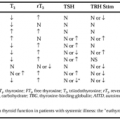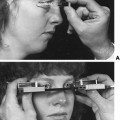TESTICULAR DYSFUNCTION IN SYSTEMIC DISEASE
H. W. Gordon Baker
Deficient testicular function is classically associated with certain severe chronic disorders, such as hepatic cirrhosis, but many acute and chronic illnesses alter testicular function in a nonspecific manner. The mechanisms probably are multifactorial, including accelerated aging, increased sensitivity to toxins, adaptation to reduced energy supply, nutritional deficiencies, stress responses, overproduction of cytokines, and autoimmune or vascular changes.1 Many drugs and toxins also affect testicular function,1,2 and these may contribute to the hypogonadism that accompanies systemic disease (see Chap. 205, Chap. 233, Chap. 235 and Chap. 239).
Stay updated, free articles. Join our Telegram channel

Full access? Get Clinical Tree





